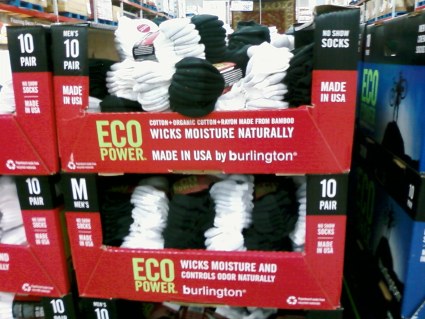When you think of the term “eco power” what do you think of? Perhaps wind mills or some type of naturally produced energy. Or maybe an all natural, organic energy drink to be consumed while working out? What you almost certainly don’t think about is socks.
Eye Catching Eco Display
A few weeks ago I noticed this display while shopping at Sam’s Club. Products being promoted in a green manner always capture my attention but I guess that is the purpose of using green catch phrases like “eco power”. It leads consumers to believe that there is something uniquely green about the product being offered. I took a closer look and realized the product on display was cotton socks so of course I had to determine how Burlington was able to make any green claims about their product.
I discovered the socks were made of “rayon made from bamboo” which supposedly gave them some terrific properties to combat moisture and odor. I also noticed that the rayon made from bamboo was a mere 2% of the overall composition and the primary material being used is cotton, the non-organic variety. The labeling and display proudly proclaimed the socks were made domestically but no real indication where the cotton came from, how it was grown and how the people who harvested it were treated. Yet, that tiny bit of “natural” composition made these socks a green product?
Is Rayon Even Natural?
According to everything I have read, rayon is neither a natural or synthetic product. It is a “semi synthetic fiber”. Any number of different naturally growing plants and trees including bamboo can produce the cellulose from which you can make rayon but in my mind, that does not necessarily make the end result bamboo, or even make it green.
I had no idea that last August the FTC came to the same conclusion when they released this bulletin.
Why Is This Product Still on the Shelf?
I took this photo on Tuesday when I re-visited Sam’s Club to pick up a few items. Right in the middle of one of their main aisles was the greenest retailer in America, Wal-Mart/Sam’s Club, selling a product that at best is questionably green and at worst, possibly intentionally misleading.
Then last night I saw an article written by Linda Casey for Packaging Digest.
It turns out letters were recently sent out by the FTC to several large retailers including Wal-Mart/Sam’s Club, warning them they were possibly violating the law and the previous FTC warning by promoting rayon products made of bamboo cellulose, as eco friendly or even anti-microbial.
The Green Consumer Must Remain Ever Vigilant
Should I be upset at Burlington for the product they are marketing or at Sam’s Club for selling it? If Wal-Mart, the “greener of the free world” could be misled into carrying this product, then how easily can we as consumers be ripped off? Perhaps I should be disappointed with the FTC for not making news like this more public or at myself for missing it?
Ironically, I usually write about green products being packaged in un-green materials but in this case, the packaging may be the greener than the product it contains.



